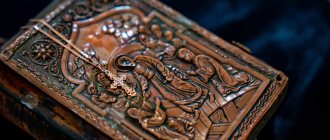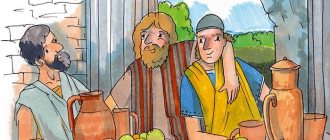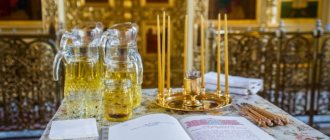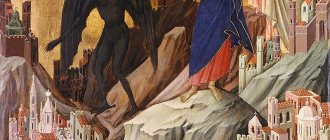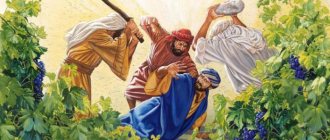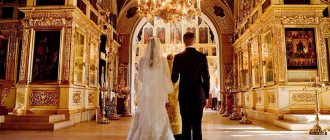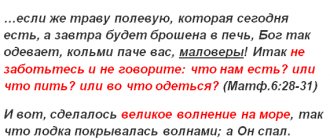Theophylact, Archbishop of Ohrid in the Byzantine province of Bulgaria (second half of the 11th - beginning of the 12th century) - a major Byzantine theologian. Originally from o. Euboea, he served for a long time as a deacon at the Church of Hagia Sophia in Constantinople and as a rhetorician. His duty was to explain the Holy Scriptures and compose instructive words on behalf of the patriarch. Having become Archbishop of the Bulgarian Church, Blessed Theophylact showed himself to be a wise and firm shepherd.
Blessed Theophylact is not one of the saints whose memory is celebrated by the Orthodox Church, but since ancient times he has enjoyed the glory of a holy father and teacher of the Church. Most of the works of Blessed Theophylact are interpretations of the Holy Scriptures, in which he follows the tradition of the fathers of the Antiochian school, especially St. John Chrysostom.
The work of Blessed Theophylact of Bulgaria, dedicated to the interpretation of the Four Gospels, is understandable to everyone and simple, and at the same time, since ancient times, has been revered by the Russian Church as a truly paternal and Orthodox creation, faithfully conveying the meaning of the Gospel sayings.
With the blessing of Metropolitan Vladimir of Tashkent and Central Asia.
Such a different gospel
The Greek word “Gospel” is translated into Russian as “good news.” In some English-speaking countries, the title of the story of the life of Jesus Christ is “Good News.” Translated into Russian this means “good news”. Orthodoxy has established a special order for how to read the Gospel every day.
To whom and when can the Gospel be read? What is a yearly cycle of reading the Gospel? What literature can help in reading and understanding the Gospel?
Gospel
Gospel for every day - for what?
The New Testament consists of the Gospels, the Epistles of the Holy Apostles, the Acts of the Holy Apostles and the Revelation of John the Theologian. The four Gospels (Matthew, Mark, Luke, John) are the central part of the New Testament. They are named after the apostles who wrote down the story of the earthly life of Jesus Christ. They all tell the same story. But their stories differ in style, semantic accents, depth and focus.
So, for example, Mark addresses the Roman pagan youth. His text contains few details, a lot of factual information, the narrative develops clearly and rapidly. John pays less attention to facts. Indeed, by the time his book was written, the events had already been described in detail by other evangelists. He also reveals the mystical, deep essence of the Savior’s coming to earth.
Why are there four Gospels? In the Old Testament, through the prophet Ezekiel (1:4-25), the Lord reveals four animals with human faces. The Holy Fathers Irenaeus of Lyon, Jerome of Stridon, Gregory Dvoeslov consider this episode to be a prophecy. According to their interpretation, it reveals the symbolic meaning of each of the 4 Gospels. In the Bible, the number four denotes spatial completeness. Today we see this in iconography: the Angel (from Matthew) is the image of Christ as a perfect Man. Lion (from Mark) is the image of the King. Taurus (from Luke) is the image of God who sacrificed Himself for the sins of all people. Eagle (from John) - the image of the Conqueror of death.
Menu
Book of kinship.Why did not Saint Matthew say “vision” or “word”, like the prophets, for they thus wrote: “The vision that Isaiah saw” (Isa. 1, 1) or “The word that came to Isaiah” (Is. 2, 1)? Do you want to know why? Because the prophets spoke to the hard-hearted and rebellious, and therefore they said that this was a Divine vision and the word of God, so that the people would fear and not despise what they said. Matthew spoke to the faithful, well-meaning, and obedient, and therefore did not first say anything like the prophets. I also have something else to say: what the prophets saw, they saw with their minds, contemplating it through the Holy Spirit; that's why they called it a vision. Matthew did not mentally see Christ and contemplate Him, but morally remained with Him and sensually listened to Him, contemplating Him in the flesh; therefore he did not say: “the vision that I saw,” or “contemplation,” but said: “The Book of Kinship.”
Jesus.
The name “Jesus” is not Greek, but Hebrew, and translated means “Savior,” for the Jews use the word “yao” to talk about salvation.
Christ.
Kings and high priests were called Christs (“Christ” in Greek means “anointed one”), for they were anointed with holy oil poured out from a horn, which was placed on their heads. The Lord is called Christ both as a King, for He reigned against sin, and as a High Priest, for He offered Himself as a sacrifice for us. He was anointed with the true oil, the Holy Spirit, and anointed above others, for who else had the Spirit like the Lord? The grace of the Holy Spirit acted in the saints, but in Christ it was not the grace of the Holy Spirit that acted, but Christ Himself, together with the Spirit of Consubstantiality with Him, performed miracles.
Son of David.
After Matthew said “Jesus,” he added “Son of David” so that you would not think that he was talking about another Jesus, for there was another famous Jesus, the leader of the Jews after Moses. But this one was called the son of Nun, and not the son of David. He lived many generations before David and was not from the tribe of Judah, from which David came, but from another.
Son of Abraham.
Why did Matthew put David before Abraham? Because David was more famous; he lived later than Abraham and was a glorious king. Of the kings, he was the first to please God and received a promise from God that Christ would arise from his seed, which is why everyone called Christ the Son of David. And David actually retained the image of Christ in himself: just as he reigned in the place of Saul, rejected by God and hated by God, so Christ came in the flesh and reigned over us after Adam lost the kingdom and power that he had over all living things and over demons .
Abraham gave birth to Isaac.
The evangelist begins his genealogy with Abraham because he was the father of the Jews, and because he was the first to receive the promise that “through his seed all nations will be blessed.” So, it is fitting to begin the genealogy of Christ from him, for Christ is the seed of Abraham, in whom all of us who were pagans and were formerly under the curse were blessed. Abraham in translation means “father of tongues”, and Isaac means “joy”, “laughter”. The Evangelist does not mention the illegitimate children of Abraham, for example, Ishmael and others, because the Jews did not descend from them, but from Isaac.
Isaac gave birth to Jacob; Jacob gave birth to Judah and his brothers.
You see that Matthew mentioned Judas and his brothers because the twelve tribes came from them.
Judah fathered Perez and Zerah by Tamar.
Judah gave Tamar in marriage to Er, one of his sons; when this one died childless, he married her to Ainan, who was also his son. When this one also lost his life for his shame, Judas no longer united her in marriage with anyone. But she, strongly desiring to have children from Abraham’s seed, put aside the clothes of widowhood, took on the form of a harlot, mixed with her father-in-law and conceived two twin children from him. When the time came for the birth, the first of the sons showed his hand from his spoon, as if he would be the first to be born. The midwife immediately marked the child's hand with a red thread so that he could recognize who would be born first. But the child carried his hand into the womb, and first another baby was born, and then the one who first showed his hand. Therefore, the one born first was called Pharez, which means “break,” because he disturbed the natural order, and the one who carried away the hand was called Zara. This story points to some mystery. Just as Zara first showed his hand, and then drew her away again, so did life in Christ: it was revealed in the saints who lived before the law and circumcision, for all of them were not justified by keeping the law and commandments, but by the life of the gospel. Look at Abraham, who for the sake of God left his father and home and renounced his nature. Look at Job, Melchizedek. But when the law came, such a life was hidden, but just as after the birth of Perez, later Zerah came out of the womb again, so after the giving of the law, the life of the gospel later shone forth, sealed with a red thread, that is, the blood of Christ. The Evangelist mentioned these two babies because their birth meant something mysterious. In addition, although Tamar, apparently, does not deserve praise for mixing with her father-in-law, the evangelist also mentioned her in order to show that Christ, who accepted everything for our sake, also accepted such ancestors. More precisely: in order to sanctify them by the fact that He Himself was born of them, for He did not come “to call the righteous, but sinners.”
Perez gave birth to Hezrom. Hezrom begat Aram, and Aram begat Abinadab. Amminadab gave birth to Nahshon. Nahshon begat Salmon. Salmon fathered Boaz by Rahab.
Some think that Rahab is the Rahab the harlot who received Joshua’s spies: she saved them and was saved herself. Matthew mentioned her in order to show that just as she was a harlot, so was the whole assembly of the Gentiles, for they committed fornication in their deeds. But those of the pagans who accepted the spies of Jesus, that is, the apostles, and believed in their words, these were all saved.
Boaz fathered Obed by Ruth.
This Ruth was a foreigner; however, she was married to Boaz. So the pagan church, being a foreigner and outside the covenants, forgot its people and the veneration of idols, and its father the devil, and the Son of God took her as a wife.
Obed gave birth to Jesse. Jesse begat King David, King David begat Solomon from Urieh.
And Matthew mentions Uriah’s wife here for the purpose of showing that one should not be ashamed of one’s ancestors, but most of all try to glorify them with one’s virtue, and that everyone is pleasing to God, even if they were descended from a harlot, if only they have virtue.
Solomon gave birth to Rehoboam. Rehoboam gave birth to Abijah. Abijah gave birth to Asa. Asa gave birth to Jehoshaphat. Jehoshaphat gave birth to Joram. Jehoram gave birth to Uzziah. Uzziah gave birth to Jotham. Jotham gave birth to Ahaz. Ahaz gave birth to Hezekiah. Hezekiah gave birth to Manasseh. Manasseh gave birth to Amon. Amon gave birth to Josiah. Josiah gave birth to Joachim. Joachim gave birth to Jehoiachin and his brothers before moving to Babylon.
The Babylonian migration is the name given to the captivity that the Jews later suffered when they were taken all together to Babylon. The Babylonians fought with them at other times, but they embittered them more moderately, and then they completely resettled them from their fatherland.
After moving to Babylon, Jeconiah gave birth to Salathiel. Shealtiel gave birth to Zerubbabel. Zerubbabel gave birth to Abihu. Abihu gave birth to Eliakim. Eliakim gave birth to Azor. Azor gave birth to Zadok. Zadok gave birth to Achim. Achim gave birth to Eliud. Elihu gave birth to Eleazar. Eleazar gave birth to Matthan. Matthan gave birth to Jacob. Jacob begat Joseph, the husband of Mary, from whom was born Jesus, who is called Christ.
Why is the genealogy of Joseph given here, and not of the Virgin Mary? What part did Joseph have in that seedless birth? Here Joseph was not the true father of Christ, so that the genealogy of Christ could be traced from Joseph. So, listen: indeed, Joseph did not have any participation in the birth of Christ, and therefore had to give the genealogy of the Mother of God; but since there was a law not to conduct genealogy through the female line (Num. 36:6), Matthew did not give the genealogy of the Virgin. Moreover, having given the genealogy of Joseph, he also gave her genealogy, for the law was not to take wives either from another tribe, or from another clan or surname, but from the same tribe and clan. Since there was such a law, it is clear that if the genealogy of Joseph is given, then the genealogy of the Mother of God is also given, for the Mother of God was from the same tribe and the same family; if not, then how could she be betrothed to him? Thus, the evangelist complied with the law, which forbade genealogy through the female line, but, nevertheless, gave the genealogy of the Virgin Mary, giving the genealogy of Joseph. He called him Mary’s husband according to the general custom, for we have the custom of calling the betrothed the husband of the betrothed, although the marriage has not yet been consummated.
So all the generations from Abraham to David are fourteen generations; and from David to the deportation to Babylon, fourteen generations; and from the migration to Babylon to Christ there are fourteen generations.
Matthew divided the clans into three parts to show the Jews that whether they were under the government of judges, as they were before David, or under the government of kings, as they were before the exile, or under the government of high priests, as they were before the coming of Christ, they did not receive any benefit from this in relation to virtue and needed a true judge, king and high priest, who is Christ. For when the kings ceased, according to the prophecy of Jacob, Christ came. But how is it possible that from the Babylonian migration to Christ there are fourteen generations, when there are only thirteen of them? If the genealogy could include a woman, then we would include Mary and complete the number. But woman is not included in the genealogy. How can this be resolved? Some say that Matthew counted the migration as a face.
The birth of Jesus Christ was like this: after the betrothal of His Mother Mary to Joseph.
Why did God allow Mary to be betrothed, and in general, why did He give people reason to suspect that Joseph knew her? So that she has a protector in misfortunes. For he cared for her during her flight into Egypt and saved her. At the same time, she was betrothed in order to hide her from the devil. The devil, having heard that the Virgin would be pregnant, would watch her. So, in order for the liar to be deceived, the Ever-Virgin becomes engaged to Joseph. The marriage was only in appearance, but in reality it did not exist.
Before they were united, it turned out that she was pregnant with the Holy Spirit.
The word “combine” here means intercourse. Before they were united, Mary conceived, which is why the amazed evangelist exclaims: “it turned out,” as if talking about something extraordinary.
Joseph, Her husband, being righteous and not wanting to make Her public, wanted to secretly let Her go.
How was Joseph righteous? While the law commands the adulteress to be exposed, that is, to be reported and punished, he intended to conceal the sin and break the law. The question is resolved primarily in the sense that already through this very thing Joseph was righteous. He did not want to be harsh, but, loving mankind in his great kindness, he shows himself above the law and lives above the commandments of the law. Then, Joseph himself knew that Mary conceived from the Holy Spirit, and therefore did not want to expose and punish the one who conceived from the Holy Spirit, and not from an adulterer. For look what the evangelist says: “it turned out that she was with child from the Holy Spirit.” For whom did it “turn out”? For Joseph, that is, he learned that Mary conceived by the Holy Spirit. Therefore, he wanted to secretly let her go, as if he did not dare to have as a wife the one who had been awarded such great grace.
But when he thought this, behold, an angel of the Lord appeared to him in a dream, saying.
When the righteous man hesitated, an angel appeared, teaching him what he should do. It appears to him in a dream because Joseph had strong faith. The angel spoke to the shepherds as rude in reality, but to Joseph as righteous and faithful, in a dream. How could he not believe when the angel taught him what he had reasoned with himself and had not told anyone? While he was thinking but not telling anyone, an angel appeared to him. Of course, Joseph believed that this was from God, for only God knows the unspeakable.
Joseph, son of David.
He called him the son of David, reminding him of the prophecy that Christ would come from the seed of David. Saying this, the angel urged Joseph not to believe, but to think about David, who had received the promise regarding Christ.
Don't be afraid to accept.
This shows that Joseph was afraid to have Mary, so as not to offend God by patronizing the adulteress. Or in other words: “do not be afraid,” that is, be afraid to touch her, as if she conceived from the Holy Spirit, but “do not be afraid to receive,” that is, to have her in your home. For in his mind and thought Joseph had already let Mary go.
Mary, your wife.
This is the angel saying: “You may think that she is an adulteress. I tell you that she is your wife,” that is, she was not corrupted by anyone, but your bride.
For what is born in Her is of the Holy Spirit.
For she is not only far from illicit intercourse, but she also conceived in some divine way, so that you should rejoice the more.
Will give birth to a Son.
So that someone does not say: “But why should I believe you that what is born is of the Spirit?”, the angel speaks of the future, namely, that the Virgin will give birth to a Son. “If in this case I turn out to be right, then it is clear that this is also true - “from the Holy Spirit.” He didn’t say “he will give birth to you,” but simply “he will give birth.” For Mary did not give birth for him, but for the whole universe, and grace did not appear for him alone, but it was poured out on everyone.
And you shall call His name Jesus.
You will name, of course, as the father and as the patron of the Virgin. For Joseph, having learned that conception is from the Spirit, no longer thought about letting the Virgin go helpless. And you will help Maria in everything.
For He will save His people from their sins.
Here it is interpreted what the word “Jesus” means, namely the Savior, “for He,” it is said, “will save His people” - not only the Jewish people, but also the pagan ones, who strive to believe and become His people. What will it save you from? Is it because of the war? No, but from “their sins.” From this it is clear that the One who will be born is God, for it is characteristic of God alone to forgive sins.
And all this happened, that what was spoken by the Lord through the prophet who spoke might be fulfilled.
Don’t think that this recently became pleasing to God—long ago, from the beginning. You, Joseph, as you who were brought up in the law and know the prophets, think about what the Lord said. He did not say “what was spoken by Isaiah,” but “by the Lord,” for it was not man who spoke, but God through the mouth of man, so the prophecy is completely reliable.
Behold, the Virgin will receive with child.
The Jews say that the prophet has not a “virgin”, but a “young woman”. They must be told that in the language of Holy Scripture, a young woman and a virgin are one and the same, for it calls an uncorrupted woman a young woman. Then, if it were not a virgin who gave birth, how could this be a sign and a miracle? For listen to Isaiah, who says that “for this reason the Lord Himself will give you a sign” (Is. 6:14), and immediately adds “behold, Virgin” and further. Therefore, if the virgin had not given birth, there would have been no sign. So, the Jews, planning evil, distort the Scripture and instead of “virgin” they put “young woman”. But whether it is a “young woman” or a “virgin”, in any case, one who is about to give birth should be considered a virgin for this to be a miracle.
And she will give birth to a Son and call His name Immanuel, which means: God is with us.
The Jews say: why is He not called Immanuel, but Jesus Christ? To this it must be said that the prophet does not say “you will name,” but “they will name,” that is, the very deeds will show that He is God, although He lives with us. Divine Scripture gives names from deeds, such as, for example: “call his name Mager-shelal-hashbaz” (Isa. 8:3), but where and who is called by that name? Since, simultaneously with the birth of the Lord, there was plunder and captivity, and wandering (idolatry) ceased, that is why it is said that He was called so, having received the name from His work.
Rising from sleep, Joseph did as the Angel of the Lord commanded him.
Look at the awakened soul, how quickly it becomes convinced.
And he accepted his wife.
Matthew constantly calls Mary the wife of Joseph, driving away evil suspicion and teaching that she was not the wife of anyone else, but him.
And I didn’t know how she finally gave birth,
that is, he never mixed with her, for the word “how” (dondezhe) here means not that he did not know her before birth, but after that he knew her, but that he never knew her at all. This is the peculiarity of the language of Scripture; Thus, the corvid did not return to the ark, “until the water dried up from the earth” (Gen. 8:6), but he did not return even after that; or again: “I am with you always, even to the end of the age” (Matthew 28:20), but after the end will it not be? How? Then even more so. Similarly, here the words: “how she finally gave birth” should be understood in the sense that Joseph did not know her either before or after her birth. For how would Joseph have touched this saint when he knew well her ineffable birth?
His firstborn son.
She calls Him the firstborn not because she allegedly gave birth to another son, but simply because He was the first born and the only one: Christ is both “firstborn,” as the first born, and “only begotten,” as having no second brother.
And he called His name Jesus.
Joseph shows his obedience here too, because he did what the angel told him.
Daily Gospel Reading
The Holy Gospel cannot be fully comprehended by reading it once as a literary text. Any miracle, conversation or parable described in this Book must be comprehended throughout life. Saint Theophan the Recluse calls us to read a certain passage of the Gospel daily and thoughtfully:
“In the morning it’s good to read the Gospel and the Apostle... And not just read, but come up with such a thought that you can spend the whole day with it.”
The rhythm of modern life does not allow a person to fully immerse himself in his spiritual life. At the same time, the truths of the Gospel are the answer to various questions that constantly confront us. This is why it is important to read the Gospel every day. The Holy Scripture reveals the Will of God to people and indicates the direction of life.
In one of his interviews, Metropolitan Longin of Saratov and Volsk said that reading the Gospel is not just an integral part of Christian life, but its basis. The Gospel is the primary source, it is the foundation, the word of God, which must constantly resound in the human heart. That is why the Holy Scripture, and above all the New Testament, is a must-read for a Christian.
Daily reading of the Word of God enriches the human soul. Saint Ignatius (Brianchaninov) said:
“Whoever explains the Gospel and all Scripture arbitrarily: thereby rejects the interpretation of it by the Holy Fathers and the Holy Spirit. Who rejects the interpretation of Scripture by the Holy Spirit; he, without any doubt, rejects the Holy Scripture itself... Read the Gospel with extreme reverence and attention. Do not consider anything in it unimportant or unworthy of consideration. Every iota of it emits a ray of life.”
Interpretation of the Gospel of Matthew
In Orthodox theology there are various methods of interpreting the Bible. The most famous theological schools are Alexandrian and Antiochian. Many Holy Fathers interpreted the inspired text.
Among the famous interpreters: John Chrysostom, Basil the Great, Maximus the Confessor, Gregory the Theologian, Theodoret of Cyrus, Theophylact of Bulgaria.
Each of them found amazing things in Scripture and, inspired by the Holy Spirit, interpreted the text according to Orthodox theology and Sacred Tradition.
In the fifth century, the text was divided into chapters to make it easier to navigate. The Gospel of Matthew consists of 28 chapters. A very brief summary of each chapter in the form of abstracts is presented below.
Chapter 1
The reader becomes acquainted with the genealogy of the Lord. Next, the evangelist talks about Joseph’s reaction when the righteous elder learned that the Blessed Virgin was pregnant. His desire to let go of the Most Pure One was stopped by an Angel. Having to go to Bethlehem for the census. Birth of the Infant God.
Chapter 2
The Magi discovered a star in the sky that foreshadowed the birth of the Savior of the world. It describes how they came to Herod with congratulations. The ruler of Judea wants to kill the born King.
The Magi bring gifts to the Infant God. The Lord reveals to the Magi the plan of the wicked ruler of Judea. Herod destroys children in Nazareth. Flight of the holy family to Egypt.
Chapter 3
Sermon of John the Baptist. The last Old Testament prophet calls for repentance. He points out to the Pharisees and Sadducees the need for moral purification. Repentance is not just a ritual, but a holistic change in the entire internal state. The Lord comes to John. The Forerunner is trying to refuse the Baptism of the Savior Himself. The word is that Jesus Himself will baptize with fire and spirit.
Chapter 4
After Baptism, the Lord retires to the desert, where he remains in fasting and prayer. A forty-day fast in the desert, which ends with the incredible exhaustion of the Savior. Temptations come from the Devil, who is trying to tempt Christ with the power of this world. The calling of the apostles. The first miracles, healings of sick, blind people.
Chapter 5
Pronunciation of the Sermon on the Mount. The perfection of the new moral law. A parable about the salt of the earth. The Lord calls not to be angry, to live in peace, to try not to offend or be offended. Try to pray for your enemies. Never swear by heaven, earth, or the name of God.
Chapter 6
Continuation of the Sermon on the Mount. Giving the Lord's Prayer. A lesson about the need for fasting and forgiveness of offenses.
The word is about the birds of the air, which neither sow nor reap, but the heavenly Father feeds them. The true treasure is not on earth, but in heaven. It is necessary to make a choice between earthly goods and faith in God.
Chapter 7
Continuation of the Sermon on the Mount. The Lord reveals to his listeners the perfect law, expressed in the Beatitudes. He says Christians are the salt of the earth. A word about the beam in one's own eye. Pronunciation of parables that had a huge influence on people.
Chapter 8
Many miracles of the Lord were performed by Him and described in the sacred text. This chapter tells about the healing of a leper and talks about the faith of a Roman soldier. Control of the earth's elements, wind and sea. Jesus has nowhere to sleep, not a single house sheltered Him. The healing of the demoniac in Capernaum, the expulsion of Christ from the city.
Chapter 9
Temptation by the Pharisees and Sadducees, healing of a paralyzed man. Forgiveness of sins. Various parables. Sharing food with sinners is a response to lawyers. Resurrection of a dead girl. Healing of a woman who had suffered from an unknown disease for 40 years.
Chapter 10
The Lord gives his disciples power and sends them to preach. Instructs them to preach everywhere and not be afraid to go anywhere. Evangelism of the Gospel is a special work that should not be paid.
All hard work will be rewarded in heaven. The Lord also repeatedly says that the apostles will suffer a lot for preaching his teachings.
Chapter 11
John the Baptist sends his disciples to the Lord. Jesus Christ calls John a true prophet. After this, the Lord rebukes the proud. Reveals the teaching about the heavenly Jerusalem that infants and people who are struggling with their passions, sins and lust can go there. Proud people are deprived of the opportunity to go to heaven.
Chapter 12
God the Father does not need sacrifice. Instead, love and mercy should dominate. Teaching about the Sabbath. Parables and denunciations of the lawyers and other Jews. It is necessary to live not according to the law, but according to the call of the heart, according to the law of God's love. He talks about the sign of the prophet Jonah. The Lord says that the disciple John the Theologian will be taken to heaven, just like the Most Holy Theotokos.
Chapter 13
Parables need to be understood simply, because they speak about very complex things, in a language understandable to all people around them. A series of parables about wheat: tares, sowers, weeds. The doctrine of the Kingdom of Heaven is revealed. The Lord compares the word of the Good News to a grain that has fallen into the ground and begins to sprout.
Chapter 14
Herod seizes the prophet John the Baptist, puts him in prison, and then executes him. The Lord feeds many people with five loaves.
Jesus Christ walks on the sea, the Apostle Peter wants to move on the sea on foot. However, after leaving the boat, Peter begins to drown. Convicting the apostles of lack of faith.
Chapter 15
Convicting the Jews of hardness of heart and deviation from the instructions of God. The Lord intercedes for the pagans. Repeatedly He points out that for the Pharisees and Sadducees the law became just a set of rules. It is necessary to fulfill the will of God not only externally, but also internally. He feeds 4,000 people and then performs many signs and wonders. Healing a man born blind.
Chapter 16
He begins to warn the apostles that He will soon be betrayed and crucified on the cross. The ardor of the Apostle Peter and praise from the Lord. The Apostle Peter will become the new foundation of the Church. Disciples need to remember the deceit of the Pharisees. Only those who follow the Savior to the end can save the soul.
Chapter 17
Casting out demons is possible only through fasting and prayer. Journey of Jesus Christ to Mount Tabor. Transfiguration. The apostles witness the miracle and run away in fear. The Lord forbids them to talk about what they saw and heard, but they still tell people, and word quickly spreads throughout Judea.
Chapter 18
It's better to lose part of your body than to seduce someone. It is necessary to forgive a person who has sinned many times. A story about a king and a debtor. God the Father cares for every person. Nothing bad will ever happen to those who love God and follow Him. The salvation of the soul is the main goal of human life.
Chapter 19
Teaching about the life of the righteous. Blessing people to create families. Husband and wife are one flesh. Divorce is possible only if one of the spouses cheats. People's material well-being makes the path to God difficult. The people who follow Christ will judge with Him in heaven.
Chapter 20
The Lord tells a parable about the winegrower's workers who came at different times, but received the same salary. He tells His followers directly that He will be killed on the cross. Seeing hesitation in the disciples, He convicts them of lack of faith.
After this, Jesus Christ heals two blind people.
Chapter 21
The Lord's triumphal entry into Jerusalem. The joy of the people and the bitterness of the Savior. The teaching is about the need not only to speak, but also to do pious deeds. A story about the evil workers of a winegrower. The answer to the question - what is the main stone of God? It is necessary to fulfill the law not in words, but by doing good deeds.
Chapter 22
Jesus Christ tells the apostles about the Kingdom in heaven. It is necessary to separate the responsibilities of a believer and a citizen of the country. The answer to the question: to Caesar - what is Caesar's, to God - what is God's. Man has a mortal nature and therefore must always be ready to stand before the judgment of God. People don’t come to a wedding in dirty clothes; you also need to prepare your soul by cleansing it to stand before the Lord.
Chapter 23
All apostles are brothers; there is no need to try to stand out from everyone else and then command. It is necessary to have a righteous court, give alms and believe in God. Inner beauty is more important. The Jews should not be arrogant and proud that they were chosen by God the Father, because they have the blood of the prophets on them, whom they mercilessly killed.
Chapter 24
You must always be prepared for death. The Lord reveals to the apostles that the end of the World is already near. Soon the earth will plunge into darkness, the sun will darken, there will be epidemics, the earth will stop bearing fruit and yielding crops. Animals will begin to die, rivers will dry up. Terrible wars will begin, people will turn into wild animals.
Chapter 25
A parable about smart maidens. All good people will be rewarded. The Lord told his followers a parable about a good and a bad servant. A good, conscientious slave will be rewarded according to his merits, and an unscrupulous worker who evades his obligations will be very severely punished.
Chapter 26
Establishment of the Sacrament of the Eucharist. Betrayal of Judas. Journey to the Garden of Gethsemane and prayer for the Cup. Taking Christ into custody. The Apostle Peter defends Jesus Christ and attacks one of the High Priest's servants. Christ heals the victim and orders the disciples to lay down their arms.
Chapter 27
Pilate's trial. The speech of Pontius and the choice of the people of Barrabas. The scourging of Jesus Christ. Iscariot comes to the high priests and returns the money, but they refuse to take it back. Suicide of Judas.
Crucifixion of the Lord. Two thieves on crosses and the repentance of one of them. Burial of Jesus Christ. Security at the tomb.
Chapter 28
Resurrection. The soldiers guarding the coffin fled in fear. The myrrh-bearing women go to the burial place to anoint the body of the Lord with incense. An angel announces a miracle to Mary. At first, the disciples do not believe in the miraculous uprising of the Teacher. The apostles saw the Savior. Unbeliever Thomas. Ascension of the Lord.
